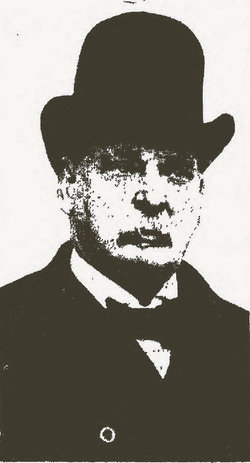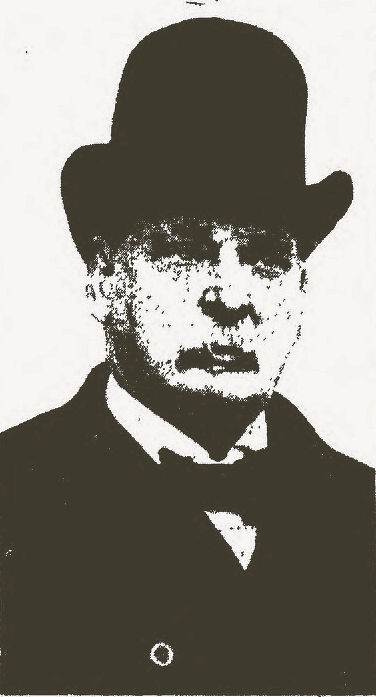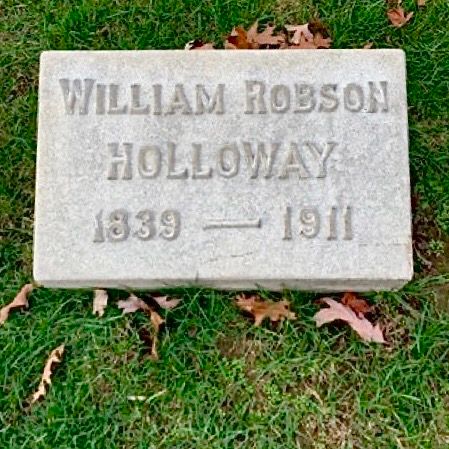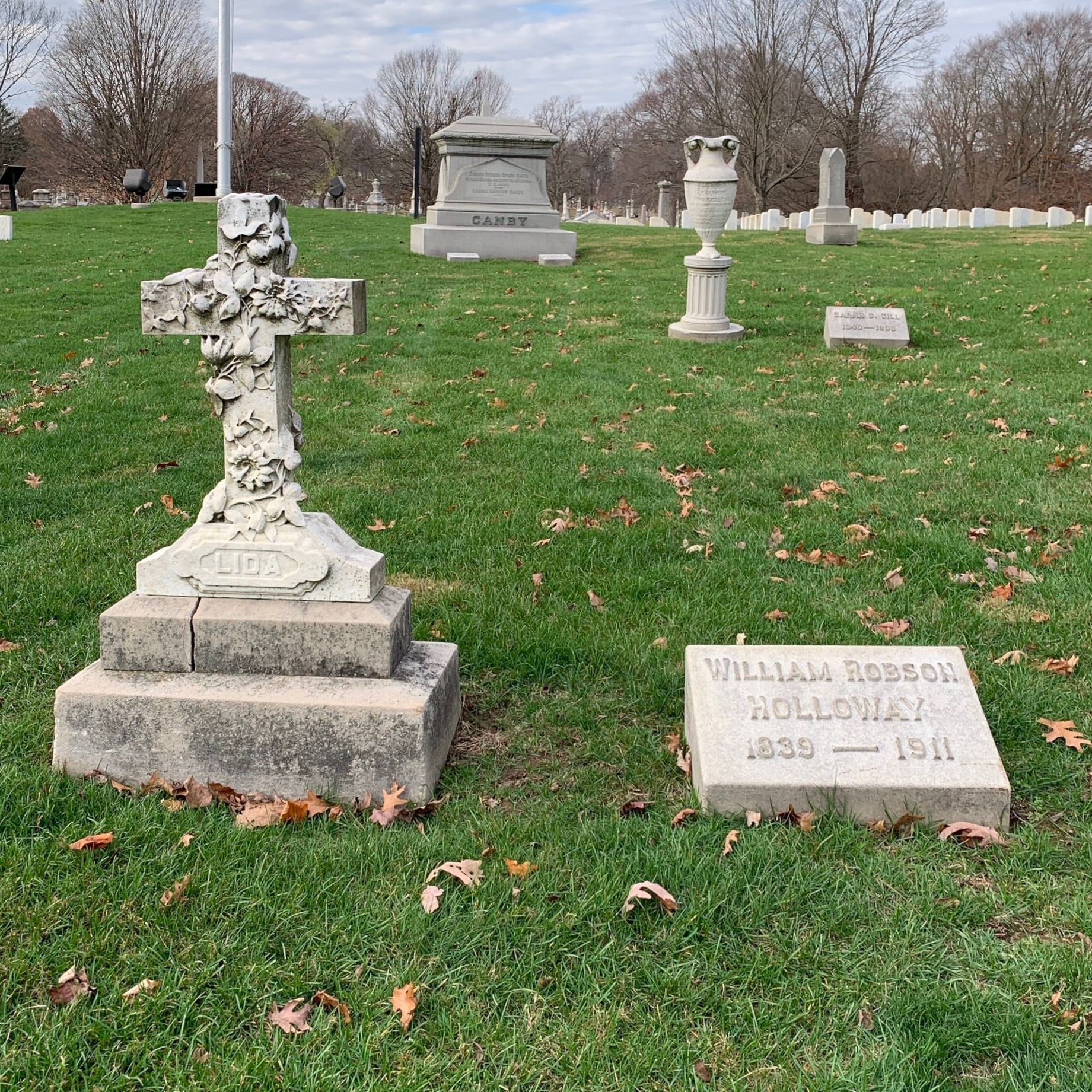William was the son of David Pierson and Jane Ann (Paulson) Holloway, the former a native of Waynesville, Ohio, and the latter of Delaware. His father was an early printer in Indiana, having bought the Richmond Palladium in 1832, and held it until his death. David served as State representative from 1843-1844, and State senator from 1844-1850. He was then elected to Congress from 1855-1857, and was appointed Commissioner of Patents in Washington, D.C. from 1861-1865. He remained there as a patent attorney until his death in 1883. His wife, Jane, was said to have contracted consumption while caring for Indiana troops encamped near Washington during the Civil war, which resulted in her death there in less than a year (1864).
William Robeson Holloway was said to have been named for his maternal ancestor, Capt. William Robeson, a Revolutionary War soldier of Wilmington, Delaware. He was educated in the public schools of his native city, and learned the printers' trade in his father's office at the Richmond Palladium. In 1858, he married Eliza Burbank, the sister of the wife of future Indiana governor, Oliver Perry Morton. William read law at the offices of Morton & Kiley at Centerville, Indiana and was admitted to the bar in 1860. In January 1861, he was appointed private secretary to his brother-in-law, Governor Oliver Perry Morton. His official capacity was the work of the sanitary commission, overseeing the conditions of soldiers, at which time he assumed the title of Colonel. He also served as state printer from 1861 to 1863. He resigned from the governor's office in 1864, having bought the Indianapolis Journal; he then disposed of his interests in that paper by 1866. In 1867, he bought back a 1/6 share of that paper. He was postmaster of Indianapolis for 12 years during both administrations of President Grant, and the first term of President Hayes. In 1881, his name was mentioned as a possible candidate for the position of 1st, 2nd, or 3rd US Assistant Postmaster General, or Secretary of the Treasury under President Garfield; having received none of those titles, he returned to Indianapolis where his wife died later that same year. In 1885, with his son Edward Morton Holloway, and his nephew, Oliver Throck Morton, bought out the remaining shareholders of the Indianapolis Times and reincorporated the business. He was private secretary to Indianapolis mayor C.S. Denny during 1896-1897, as well as the secretary of the public park commission. In 1897, he was appointed consul-general to St. Petersburg, Russia, by President McKinley, a position he held until suffering a stroke in 1904. He was then appointed consul-general to Halifax, Nova Scotia by President Roosevelt, until his retirement in 1907. He continued to write and publish local histories of Indianapolis, Indiana's involvement in the Civil War, and of Governor Oliver Perry Morton until his death. He had published his first such history of Indianapolis in 1870.
Contributor: Richard S. Clark
William was the son of David Pierson and Jane Ann (Paulson) Holloway, the former a native of Waynesville, Ohio, and the latter of Delaware. His father was an early printer in Indiana, having bought the Richmond Palladium in 1832, and held it until his death. David served as State representative from 1843-1844, and State senator from 1844-1850. He was then elected to Congress from 1855-1857, and was appointed Commissioner of Patents in Washington, D.C. from 1861-1865. He remained there as a patent attorney until his death in 1883. His wife, Jane, was said to have contracted consumption while caring for Indiana troops encamped near Washington during the Civil war, which resulted in her death there in less than a year (1864).
William Robeson Holloway was said to have been named for his maternal ancestor, Capt. William Robeson, a Revolutionary War soldier of Wilmington, Delaware. He was educated in the public schools of his native city, and learned the printers' trade in his father's office at the Richmond Palladium. In 1858, he married Eliza Burbank, the sister of the wife of future Indiana governor, Oliver Perry Morton. William read law at the offices of Morton & Kiley at Centerville, Indiana and was admitted to the bar in 1860. In January 1861, he was appointed private secretary to his brother-in-law, Governor Oliver Perry Morton. His official capacity was the work of the sanitary commission, overseeing the conditions of soldiers, at which time he assumed the title of Colonel. He also served as state printer from 1861 to 1863. He resigned from the governor's office in 1864, having bought the Indianapolis Journal; he then disposed of his interests in that paper by 1866. In 1867, he bought back a 1/6 share of that paper. He was postmaster of Indianapolis for 12 years during both administrations of President Grant, and the first term of President Hayes. In 1881, his name was mentioned as a possible candidate for the position of 1st, 2nd, or 3rd US Assistant Postmaster General, or Secretary of the Treasury under President Garfield; having received none of those titles, he returned to Indianapolis where his wife died later that same year. In 1885, with his son Edward Morton Holloway, and his nephew, Oliver Throck Morton, bought out the remaining shareholders of the Indianapolis Times and reincorporated the business. He was private secretary to Indianapolis mayor C.S. Denny during 1896-1897, as well as the secretary of the public park commission. In 1897, he was appointed consul-general to St. Petersburg, Russia, by President McKinley, a position he held until suffering a stroke in 1904. He was then appointed consul-general to Halifax, Nova Scotia by President Roosevelt, until his retirement in 1907. He continued to write and publish local histories of Indianapolis, Indiana's involvement in the Civil War, and of Governor Oliver Perry Morton until his death. He had published his first such history of Indianapolis in 1870.
Contributor: Richard S. Clark
Gravesite Details
burial: JAN 2,1912
Family Members
Sponsored by Ancestry
Advertisement
Advertisement












